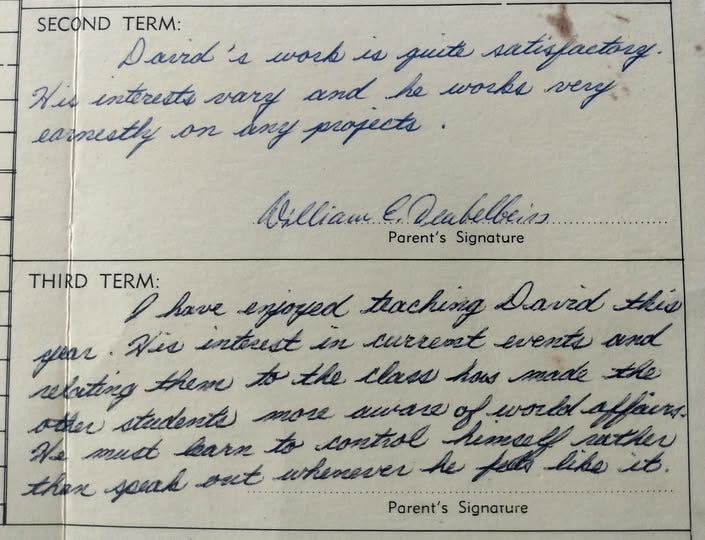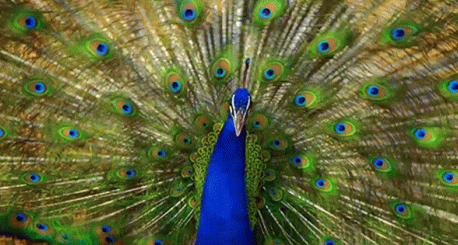Token Knowledge
What has happened to our students', our own, joy of knowing something?
"We can know more than we can tell." - Michael Polyani
A few thoughts about AI. I’ll be returning to the subject in the coming weeks, I still have much to say, especially as it relates to education.
Let me begin by way of a story.
I grew up a very curious, may I say “precocious” young boy. Living on a farm, far from everything, I loved “knowing” stuff. And that meant for the most part, books, the library, and especially Kern’s Public School.
My father had a briefcase kind of bag with a map of the world on it. I adopted it and carried it around everywhere. Whoever visited our homestead had to endure the ritual of quizzing me about all the countries, capitals of the world. Further, endure sidebars and stories about each of these places (fed by my voracious reading of National Geographic magazines).
At school, I loved showing off my knowledge. At school, we’d start the day by reviewing current events. Nobody in class would say a thing but I’d get up in front of the class daily, recounting what’s happening in the world and showing off my knowledge of everything. My classmates loved it, it deeply ate into our dreaded first period math class!
I’m still that kid! Proud as a peacock, showing off my knowledge, aswim in the lake of knowledge and gleeful that I know stuff. I still watch Jeopardy with a racing heart beat and my favorite monthly activity is reading Harper’s Index and Findings sections.
Knowledge is a highway, how I enter and interact and move with the world.
I relate this by way of asking some questions - what will happen to this joy, this curiosity about the world, the life we live, now that generative AI can just feed us knowledge?
What will this domestication of our minds entail? Will the wild mind that is what makes us so human, be finally tamed? What will happen when students are no longer proud to show off their own knowledge but rather just be skilled at prompting and outputing “intelligence” through thinking machines?
Do we really want a world where knowledge is controlled and stored in a spreadsheet in the cloud - bypassing the organic, verdant mind?
Me, I choose what will always remain the ethos and heart of education - instilling in young minds, maintaining and nurturing in young minds, the joy of knowing stuff. It’s should be all of our mission statements, as educators.
Let me explain why “knowing stuff” is worth fighting for - why we must reject the “token knowledge” that is AI fed and maintain our diet of real world knowledge digested by “a self”.
Do you remember the excitement, the futuristic fervor of the internet’s first days? Google had all the answers. Every fact there on your phone. Nobody had to know anything, anymore! Raul Midon, in his cool song at the time, sang it best. Seems an eternity ago, but here we go again …
There is a false belief that knowledge and intelligence aren’t linked, that they are seperate. So many believe that you can just “look up” stuff when needed and intelligence is divorced from facts, discrete knowledge - be that of our experience or the knowledge of reality. It’s objectivism taken too far.
From an early age, I was enamoured by the intelligence and mind of the Polyani brothers, Karl and Michael. But above all stood especially Michael Polyani’s - Personal Knowledge. It was a well-argued manifesto that our personal participation in knowledge, its discovery and validation is how science works, develops. Drop that (what he labeled “tacit knowing”) and you stall the development of the mind and thus, socially, our own civilizational epistemological “progress”. We are what we know and this knowing is an important part of being in the world, and how we maintain contact with the reality of the world.
There is no seperation of knowledge and intelligence. There is no such thing as a pure, gleaming, steely impersonal knowledge. Data is always altered by a “knower”. Knowledge and Knower are one. We fool ourselves if we believe a machine will “crunch” reality, be “all - knowing”. In truth, if we take this road, we are only trading in our own agency, our own organic green for the dead wood “knowing” of an algorithm.
Google, Open AI do have all the answers. But do we want THEIR answers or do we want our own? That is the question.
The ubiquitous use of AI by students, by “knowers” is to forgo and slowly rot our own force that through the green fuse drives the flower.
Of course, you then have teachers, professors saying, “But students will only co-create with generative AI.” I say bullocks.
If I’ve learned in sum anything through my 6 decades here on planet earth, it is a Doestoyevskian realization that one of the base traits of human beings is our laziness. Our sloth, it’s both a blessing and a curse. Laziness has made us discover so much, in the hopes of saving effort and time. But when it comes to our mind, there are no shortcuts. You can’t run a marathon in any other way than running a marathon. Remember, the brain is a muscle - use it or lose it.
As Normal Finklestein outlines so well here - students (everyone really) using AI as a supplemental tool will eventually sucuumb to its allure and sloppy efficiencies. One must exercise maximal discipline to avoid it incrementally taking over your own faculties, your own agency, emptying you of your tacit knowledge. Using LLMs to write something is much akin to abandoning your “self”, it is an original sin.
What we need to do as educators is return to a focus on the joy of learning and discovering what we are capable of - by ourselves. That joy of the peacock frisky with its feathers.
As I’m so fond of quoting in a Timothy Leary way …
“Think for yourself. Write your own words. Question technology.”
This in a nutshell is why I resist AI as a tool, in its totality, when it comes to teaching students.
I’ll end with my beloved T.S. Eliot. Then I’m turning off the machine and taking my walk up the mountain, this rainy day … me, the dog and my discovery of the world - it’s knowledge is there for my taking.









Education has become too obsessed with testing and measuring. AIs consume massive amounts of information correlating, looking for patterns to make predictions. It is the foundation of the scientific method. We bore children to death distilling dry facts devoid of art. I used to enjoy primary readers with beautiful art and popular children stories. Now they have been replaced with sterile photographs and brain dead sentences that cannot even be called prose. Kids need to be encouraged to predict, create, and test their beliefs.
Every chapter of a book should pose a question that excites the imagination, and then surprise us with interesting answers as we turn the pages that challenge our assumptions. Modern CGI films overwhelm our senses leaving us craving another hit of dopamine, but thry do not engage our imagination. It is the monster in the closet or under our bed that makes for great drama, and books should open windows. The thing I hate most about teaching in Korea are the classroom windows covered with signs, and brain dead ESL books fed in two page morsels to students who dread turning the page because they know what they will find.
The problem with AI is you get the answer without the joy of the journey, and you miss the beauty and growth that comes with the journey. Our brains weigh words the same way an AI does, but unless it does the heavy lifting it will atrophy. A good story teller knows what facts and details are important. It takes practice. We need to teach kids to enjoy listening and telling stories to develop empathy. That means paying quality authors and artists to inspire them, not billions on AI to bankrupt those authors and write mind numbing textbooks.